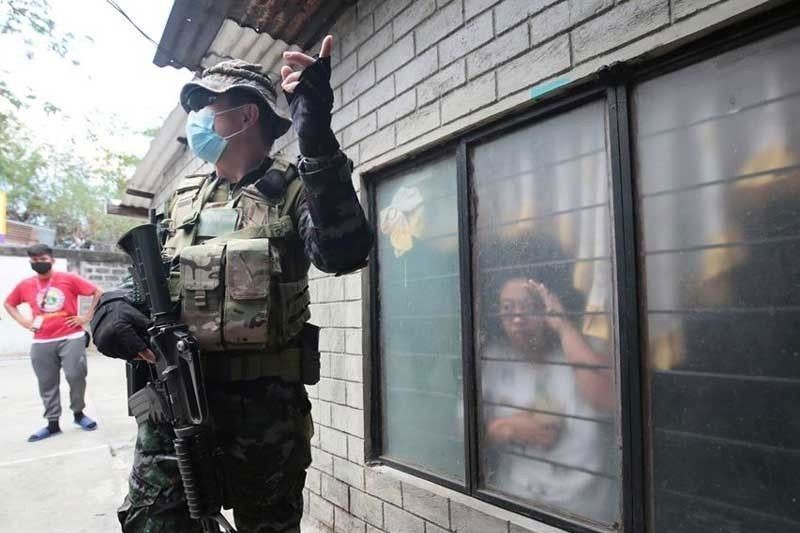Proposed ban on home quarantine put on hold

MANILA, Philippines — The ban on home quarantine for mild and asymptomatic cases of COVID-19 has been placed on hold as the Inter-Agency Task Force for the Management of Emerging Infectious Diseases (IATF) has decided to study the proposal further, the Department of Health (DOH) said on Thursday night.
DOH Undersecretary Maria Rosario Vergeire told “The Chiefs” on OneNews / TV5 that the IATF is taking a second look at the recommendation of the National Task Force (NTF) on COVID-19 and the Department of the Interior and Local Government (DILG) to disallow home quarantine.
She said the proposal was brought up at an IATF meeting on Thursday and it decided to study the proposal further, but they are expecting the task force to issue a resolution on this issue next week.
“When the NTF and the DILG were going around the community, they found that the home quarantine being undertaken by many of our fellow countrymen were not conducive and compliant to the protocols. So the IATF is studying this more,” she maintained.
Because of this, she pointed out that home quarantine had contributed to the spread of COVID-19 cases in the community.
Based on quarantine protocols, individuals could undergo home isolation provided that they have their own separate room with separate comfort room and that there are no vulnerable persons in the household such as senior citizens and those with pre-existing conditions.
NTF response chief implementer Carlito Galvez earlier said the government should strictly implement the no home quarantine policy for asymptomatic and mild COVID cases to prevent the spread of the virus among family members of the patients.
Galvez cited his recent visits to Cotabato, Iligan
and Cagayan de Oro cities wherein cases increased in number among households with COVID-19 patients that were on home quarantine but were not totally isolated from their relatives at their house.
He said that Valenzuela City and Bulacan were right when local officials implemented a no home quarantine policy and provided quarantine hotels to patients that resulted in the decline of COVID-19 cases in these areas.
Vergeire admitted that the DOH is cold on the banning of home quarantine because this requires government resources.
“It will require resources to make sure that the temporary treatment and management facilities (TTMFs) would be enough and adequate for everybody who will be identified as mild and asymptomatic,” she said.
According to her, this will also require more “human health resources” who would be assigned to these facilities.
Currently, some 10,000 slots for healthcare workers were approved for the DOH’s emergency hiring program but almost 8,000 were actually hired.
Vergeire added that putting all of the mild and asymptomatic cases in TTMF would also require a bigger budget for their food and other supplies.
The government has yet to finalize the rules on the proposal to put all COVID-19 patients in state-run quarantine facilities, pending more consultations with local government units (LGUs).
According to presidential spokesman Harry Roque Jr, the plan has yet to be implemented since the members of the IATF are still discussing the matter with LGUs.
Roque said the approval of the rules are yet to be done, pending consultations with the concerned sectors.
In the recent months, the government has encouraged home isolation for mild and asymptomatic patients as long as they have separate rooms and bathrooms from the rest of the uninfected household members. Only serious cases were brought to hospitals.
COVID-19 data
On Thursday, the IATF approved additional guidelines for the standardization of reporting and accountabilities for the management of COVID-19 cases and reporting in the DOH’s information system.
The IATF approved resolution no. 70 to better consolidate data on the number of COVID-19 cases, the number of testing, the list of those who recovered and their respective classifications based on the guidelines of the DOH.
IATF co-chair Sec. Karlo Nograles signed the four-page resolution promulgated last Thursday. Based on data by Sept. 10, there are a total of 55,823 active cases in the Philippines with around 4,000 deaths.
To ensure proper documentation of COVID-19 cases, the IATF has ruled that cases shall be reported and managed based on their current address at the time of consult, irrespective of their permanent address.
Locally stranded individuals shall be tagged, reported and managed by the receiving LGU, and the sending LGU shall be informed to assist in contact-tracing.
In instances wherein COVID-19 cases reside in more than one current address, the IATF said cases shall be reported and managed in the address where the case is currently isolated or quarantined.
“Cases with no full address shall be reported based on the location of the Disease Reporting Unit (DRUs), and such information shall be updated by the DRU during case management,” it said.
The IATF added that cases shall be automatically tagged in official information systems based on the principles outlined by the task force. “In instances where there is conflict in reporting, the LGU shall coordinate with the Regional Epidemiology and Surveillance Unit (RESU) or the Department of Health to resolve official reporting of case,” the task force said.
StaySafe.PH
Meanwhile, the IATF also adopted the recommendations of the Department of Information and Communications Technology, which pushed for maximizing of the use of StaySafe.PH as the official system for social-distancing, health-condition reporting and contact tracing.
The system aims to assist the government’s response to COVID-19, the IATF said.
Upon the finalization of the memorandum of agreement or such other deed or agreement entered into by MultiSys Technology Corporation and the DOH, the DOH shall be designated as personal information controller (PIC).
The GPS-function for contact tracers shall be allowed to be enabled and all other agreements entered into shall remain valid and binding.
For this purpose, the IATF said the training, integration and the use of StaySafe.PH and the COVID-19 Data Repository System (CDRS) shall be incorporated in the country’s COVID-19 response, particularly in the response of the LGUs.
Vergeire also said that the clinical trial for the Japanese anti-flu drug Avigan has not started since there are some documentary requirements that are still being prepared.
She, however, confirmed that there are Avigan drug donated by China to the National Security Council that are now being used by COVID-19 patients under a special permit for “compassionate use” issued by the Food and Drug Administration.
This donation was distributed to various LGUs, including the city of Manila, and were eventually given to various hospitals.
Vergeire added that as a policy, doctors and hospitals that will use “off label drugs” would have to apply with FDA for such special permit and get the informed consent of patients.
“There is still no cure for COVID-19. All of the off label drugs are being tried but it has not been proven that any of them can cure COVID-19,” she maintained. - Christina Mendez
- Latest
- Trending





























